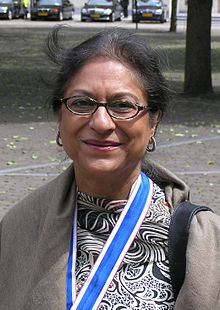One year ago, Pakistan lost one of its leading advocates of human rights and civilian supremacy, noted Supreme Court advocate and founding member of the Human Rights Commission of Pakistan, Asma Jahangir. At a time when Pakistanis continue to face the onslaught of the deep state and the media, civil society activists, and academics face constant threats to their rights, Asma Jahangir’s loss is felt deeply.

In a statement released by the Human Rights Commission of Pakistan (HRCP), which she co-founded in 1987, “Today, more than ever, the human rights movement in Pakistan needs a collective conscience. Undoubtedly, were Asma Jahangir still with us, she would have continued to speak up against curbs on freedom of assembly, freedom of movement and freedom of expression. She would have demanded accountability for extrajudicial killings and enforced disappearances. She would have defended the vulnerable and marginalised – women, children, peasants and workers, bonded labour, religious and ethnic minorities, and the transgender community. She would have criticised any electoral mismanagement and judicial hyper-activism, but defended the need for democracy and an independent judiciary. And in so doing, she would be speaking for all those who believe in the inalienability of fundamental rights and freedoms. Over the last year, HRCP has carried this work forward despite the vacuum left by Ms Jahangir. Her imprint remains on the institution she co-founded and the numerous human rights workers she trained. HRCP’s governing body and its staff across the country are committed to continuing Asma Jahangir’s work, and will always remember her spirit and steel. As she herself once quipped, “Human rights is not a job, it is a way of life.” For HRCP, this still holds true.”
An editorial in Dawn stated that Ms Jahangir was “one of the bravest daughters of Pakistan,” “redoubtable defender of human rights and democratic values, champion of the downtrodden, and fierce opponent of repressive forces.” Ms Jahangir “had been schooled in the politics of resistance very early; as a young woman she took on Gen Yahya Khan’s martial law regime in order to have her activist father released from prison. She was a thorn in the side of the next military dictator too, fighting on the streets and in the courts his myriad misogynistic edicts and violations of people’s rights, violations that characterise the ascendancy of anti-democratic forces.”
Further, “it was her sense of justice that must continue to inspire all those who seek a more equitable society. Individual freedoms, she believed, must be protected at all costs. She was undeterred by labels of being a traitor to her religion and her country, the usual emotive tropes so beloved of bigots and hyper-nationalists. When the National Assembly, to its enduring shame, listened in silence while the then prime minister’s son-in-law launched into vile invective against a persecuted religious minority, it was Asma who denounced him for his hate speech. It was also Asma who represented MQM supremo Altaf Hussain after the Lahore High Court banned the media from covering the party’s activities. In so doing, she was defending a basic tenet of democracy — freedom of speech — that everyone, including the MQM, is entitled to no matter what their politics. On that principle she would not compromise, even while faced with angry denunciations from a section of her own fraternity. Asma spoke truth to power, and we must continue her legacy.”
![]()





